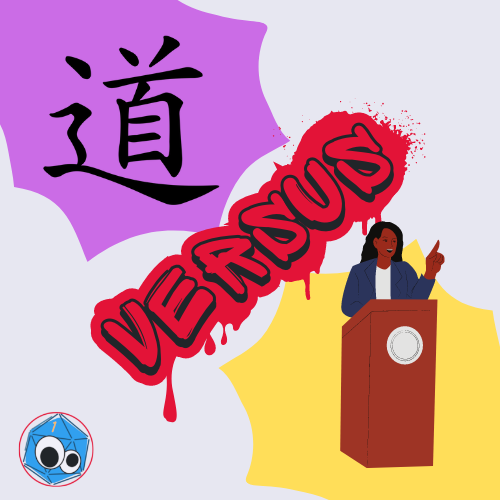Laozi, like Homer of Greece, may be a real person, a literary creation, or somewhere in between. In any case, Daoist ideas attributed to him often conflict with Confucian traditionalism and universal appeals to authoritarian legalism. I would argue the Way resembles what we might call "natural law" in western philosophy.
I don't want to come across as pretentious, and I do not claim to be an expert in Daoism, either as a philosophy or religion. Nonetheless, I do have a passing interest in its concepts about the futility, arrogance, and destructive effects of power which seem to align with many other ideas I have pursued. It warns against trying to forcibly impose human will in opposition to the natural flow of the Way.
By a resort to force, things flourish for a time but then decay. This is not like the Dao and that which is not Dao-like will soon cease. Dao De Jing, Chapter 30, line 4
He also advises rulers that instead of taking action to impose reform and change, they instead reform and change themselves, and allow the Way to bring change through their inaction, rather than mucking things up though impulsive interference.
Tao is apparently inactive (wu wei) and yet nothing remains undone. If princes and kings desire to keep everything in order, they must first reform themselves. (If princes and kings would follow the example of Dao, then all things will reform themselves.) If they still desire to change, I would pacify them by the simplicity of the ineffable Dao. Dao De Jing, Chapter 37, lines 1 & 2
Again, this is very context-dependent, and I am likely oblivious to layers of cultural nuance. Take my views with a massive grain of salt, and feel free to read as much as you like while forming your own opinion. However, this idea strikes me as the polar opposite of what we see every election cycle, and I want to draw attention to a very specific contrast to the Politician's Syllogism.
- We must do something.
- This is something.
- Therefore, we must do this.
Every election cycle around the world seems to revolve around this line of argument. Is there a problem? Government must act! The politician has an action plan, so it must be the solution! If you question the plan, you must be either oblivious to the problem, or else you must support the problem! I wrote a less-structured post on this general subject recently.

Image created in Canva
This same issue arises in every contentious topic. Instead of finding the natural Way, politicians and their most ardent supporters demand the use of force as if reality can be shaped and molded to suit their whims.
Something is wrong with the economy. The Democrats want price controls, redistribution of wealth through taxation, and a welfare state. The Republicans talk about free markets, but their policies consistently include corporate subsidies, international trade regulation, money supply inflation, and other destructive interventions. We the people would be more likely to prosper if our would-be rulers would simply let the market of people engaged in production and exchanges find our Way by voluntary means.
The Harris Campaign has an expansive "fact sheet" exhibiting this very flaw. Just look at the blame game regarding inflation and groceries. Her points are as follows:
- Advance the first-ever federal ban on price gouging on food and groceries;
- Set clear rules of the road to make clear that big corporations can’t unfairly exploit consumers to run up excessive profits on food and groceries.
- Secure new authority for the FTC and state attorneys general to investigate and impose strict new penalties on companies that break the rules.
What is inflation? What is "price-gouging?" I don't think she knows. She asserts big corporations are exploiting consumers, but hasn't actually demonstrated it. How can any policy she could impose actually fix the root issues of money supply inflation, Cantillon effects benefiting the politically-connected recipients of new money and credit, or the decades of regulatory capture consolidating control of entire market sectors into the hands of a few mega-corporations? She has already played a role in creating these problems, but wants to shift the blame while proposing a solution which doubles down on those same errors.
There isn't any shortage of issues on the Republican side, either, although the Project 2025 hysteria is overshadowing the actual Trump campaign platform. Maybe I should take some time to winnow the wheat from the chaff in the Heritage Foundation's proposal in a future post, but for my purposes here, I prefer to take the Trump plan from his own site.
- END INFLATION, AND MAKE AMERICA AFFORDABLE AGAIN
I don't think Trump knows what really drives inflation, either, but at least he's concise, and his CAPS LOCK is on brand. He seems less delusional about the power of legislative fiat to rewrite reality, but then again, he was also the one in charge when COVID hit and the first round of "relief funding" ballooned the money supply.

source
If you can't read the chart, let me give some numbers. In January 2020, the total M2 money supply was $15,380.6 billion dollars. Starting in March 2020, the CARES Act (don't you love these propagandistic acronyms?) started pumping "stimulus money" into the economy. The checks sent to Americans were a tiny drop in the bucket compared to corporate handouts. in May, the Federal Reserve adjusted how they defined M1 and M2 money supplies, with the former seeing a much more dramatic recalculation jump, and both still showing unprecedented growth slopes after the recalculations were applied. Both charts peaked in early 2022, with the M2 at 21,720.9 billion dollars. This was well into the Biden administration after he continued and expanded many of the worst Trump era COVID policies. Both charts then show a slight tapering through 2023 and then resumption of a more gradual upward slope in 2024.
That is inflation in action. Printing more dollars does not produce more real wealth. All else being equal, when more dollars chase the same supply of goods and services, the result is rising prices denominated in those now-devalued dollars. In the grocery market specifically, everyone throughout the supply chain from farmer to local grocer must balance growing present and future costs against accommodating buyers who do not have the newly-created dollars that have diluted the buying power of their dollars. Price inflation (along with product shrinkflation and skimpflation in response) is fundamentally a consequence of money supply inflation. Market sectors see these impacts at different times as new money and credit flow through the economy and alter the exchange calculations market actors must make in response, creating even more chaos due to uncertainty.
Every time a political solution backfires, if it is even acknowledged at all, we are told, "but at least they had good intentions." Did they, though? Hanlon's Razor says, "Never attribute to malice that which is adequately explained by stupidity." This pattern of intervention justified by good intentions followed by unintended consequences is too regular, and these politicians are attended by legions of flunkies who claim to be experts in these subjects. At some point, we have to ask what they really intend, and how long they can claim ignorance.
Additionally, beware of any post hoc and cum hoc causation fallacies flooding political discourse from people looking for scapegoats instead of trying to understand the mechanisms of money. Wage increases are a consequence of inflation, not the root cause. Energy prices are affected by myriad factors, including money supply inflation, but are not the driving force causing inflation. The rising prices which follow money supply inflation, and even the "unprecedented profits" breathlessly reported by left-leaning critics of corporations, are not in and of themselves proof of exploitative practices by anyone outside the political class.
Something needed to be done. Politicians did something. In hindsight, was it really what needed to be done? Are we seeing the application of force bring decay as a consequence? When anyone demands we submit to yet another round of reforms, we need to suggest they start by reforming themselves.

Always attribute to malice that which has been happening for far too long to be stupidity. - Yuri Bezmenov
Maybe I missed it, but I have not seen Democrats (or Harris in particular) call for Nixon-style price controls, which are not the same as price gouging laws. Many states already have laws related to price gouging.
Yes, there are price gouging laws at the state level in many states. These laws are bad. They apply to disasters when demand spikes for specific goods, and supply is low. This is a natural rationing process and a signal to those outside the disaster area to respond by bringing those needed supplies.
Harris says there is a "price gouging" problem as I quoted above, and she intends to address it at the federal level. A bit over a week ago, Paul Krugman wrote that Harris wasn't planning price controls, just price gouging protections, but his own economics text describes price ceilings as a form of price controls with known deleterious effects.
Harris is very vague about her actual policies. It's one of her worst traits this election cycle. However, many left-leaning commentators have been complaining for years now that corporations are raising prices and seeing record profits while people suffer. She keeps blaming middlemen in food, healthcare, and other industries for keeping prices high post-pandemic without any real analysis of inflation as I provided or acceptece of her own role in the actual policies that have been implemented, instead continuing the Biden campaign claim (and Krugman claim) we're so prosperous now yet no one understands it.